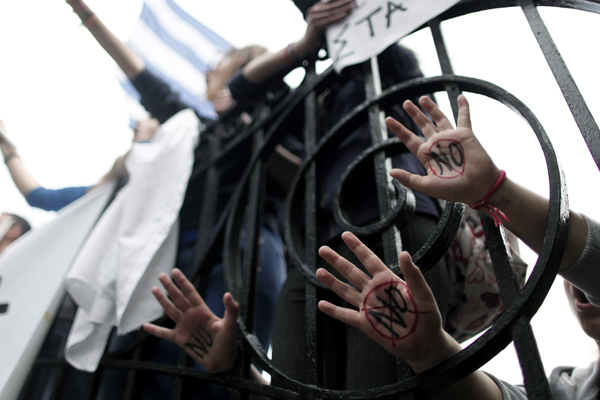Cyprus readies capital controls
|
Cypriot students demand social justice and protest government levies on private savings, at the entrance to the presidential palace in the capital Nicosia on Tuesday. Petros Giannakouris / Associated Press |
Thousands protest bailout they fear will knock country into a slump
Cyprus scrambled on Wednesday to finalize capital controls to avert a run on banks, a day before they are due to reopen after a nearly two-week lockdown during which the island secured a huge bailout.
Cypriots have taken to the streets of Nicosia in the thousands to protest a bailout deal they fear will push their country into an economic slump and cost many their jobs.
European leaders said the deal averted a chaotic national bankruptcy that might have forced Cyprus to drop the euro.
With banks due to reopen on Thursday, Finance Minister Michael Sarris said he expected the control measures to be ready by noon. "I think they will be within the realms of reason," he said, without elaborating.
"We will look at the best way to limit the possibility of large sums of money leaving, and not imposing punitive conditions on the economy, businesses and individuals," Sarris said in a Cyprus television interview.
The central bank governor said earlier that "loose" controls will apply temporarily to all banks. Earlier, the finance minister said they could be in place for weeks. Banks have been shut since final bailout talks got under way in mid-March.
Russia, whose citizens have billions of euros in Cypriot banks, cautioned Nicosia against imposing onerous controls on healthy banks.
"If there are such measures, this will not foster trust but only provoke additional problems for participants, depositors," Russian Finance Minister Anton Siluanov, in South Africa for a summit of BRICS nations, said on Tuesday.
State-controlled Russian bank VTB has a subsidiary in Cyprus, Russian Commercial Bank, which has not been affected by the bailout deal.
Siluanov cautioned that Russian willingness to restructure and extend a 2.5-billion-euro ($3.2-billion) loan to Cyprus from 2011 will depend on the island's decision on capital controls.
Popular anger rises
The terms of the 10 billion euro rescue with the European Union, International Monetary Fund and European Central Bank have stirred popular anger within Cyprus at the country's partners in the EU, notably Germany, the bloc's main paymaster and fiercest advocate of austerity.
On Tuesday, up to 3,000 high school students protested at Parliament, in the first major expression of popular anger since the bailout was agreed in the early hours of Monday morning in Brussels. The deal largely side-stepped Parliament, and has triggered opposition calls for a referendum.
"They've just got rid of all our dreams," said one student named Thomas.
Outside the central bank, about 200 employees of the country's biggest commercial lender, the Bank of Cyprus, demanded the resignation of central bank Governor Panicos Demetriades, chanting "Hands off Cyprus" and "Disgrace".
Dimos Dimosthenous, a veteran Bank of Cyprus employee, said: "The bank is being driven to closure. That will be the end."
The bank on Wednesday sacked Chief Executive Yiannis Kypri, state media said.
That follows the appointment of a special administrator to run the bank, which is being restructured as part of the bailout deal, and an offer to resign by its chairman, Andreas Artemis.
Big accounts frozen
Under the terms of the bailout, the second-largest lender, Cyprus Popular Bank, is to be shut down, and accounts of under 100,000 euros will be moved to the Bank of Cyprus. Bigger accounts at both banks will be frozen.
Government officials have estimated that these larger depositors, many of them wealthy foreigners, including Russians, could lose about 40 percent of their cash.
On Wednesday, the government was appointing special crisis teams of economic experts to advise ministers.
Many Cypriots say they do not feel reassured by the bailout deal, however, and are expected to besiege banks as soon as they reopen.
Maria Benaki, who runs a family silverware business on Nicosia's biggest shopping street, said she had not had a customer in days.
"The situation is dire," she said. "What will happen at the end of the month when I need to pay my bills?"
Reuters-AFP



















